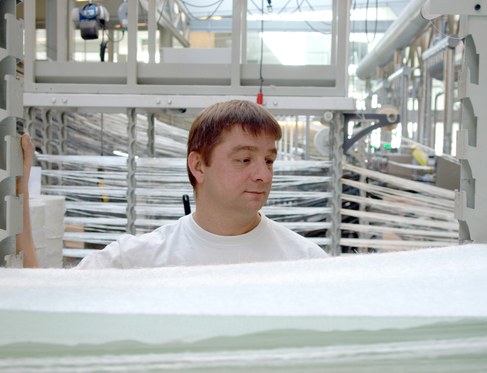Arne Olsen shudders at the thought of the nearly eight months he
spent being unemployed. After ten years as an unskilled worker, jobs
were hard to find. His days all merged into one.
“I spent lots of time achieving absolutely nothing. I would have
taken any job, but with no education, a few years in the army and ten
years working as a builder my options were pretty slim,” says Arne
Olsen.
Then one day his job centre urged him to attend an information
meeting at Fiberline, a company in the city of Middelfart making fibre
glass parts for wind turbines, windows and bridges. The company were
cooperating with the local labour market training centre (AMU Center
Ribe) to help long-term unemployed get new qualifications. There was an
offer of a six month course followed by one month of practical
experience at the company. It became 43 year-old Arne Olsen’s turning
point.
“I’d never seen myself working with fibre glass, and I said quite
openly that this was not for me. I accepted the offer nevertheless,
because I do quite like trying something new. I’ve now been doing this
exciting job for three and a half years, on a permanent contract. It’s
great having a tidy economy and to have something to do.”
A success story
Arne Olsen now works in a key position which involves responsibility
for setting up production machinery. He is one out of 32 long-term
unemployed unskilled workers who have been offered practical experience
to learn how to operate the company’s machinery. 10 out of the 32 have
been offered permanent jobs. Fiberline’s head of personnel, Kirsten
Bøjler Dall, doesn’t hesitate to call this a success.
“We were willing to take a chance and offer training to long-term
unemployed, unskilled workers, followed by jobs on our production line.
They would normally not be our target group. We have definitely not
regretted it. It’s been a success story. Many of them have become some
of our best workers,” she says.
The success was, according to the head of personnel, very much the
result of working closely with job centres and the AMU centre – as well
as a good deal of bravery and willingness to think outside the box. All
this formed part of the advise given to Denmark’s Minister of
Employment, Inger Støjberg, when she recently used Fiberline as an
example in one of her so-called inspiration meetings. She gathers
concrete suggestions locally for measures that can limit the country’s
rapidly growing long-term unemployment.
Meet prepared
Also present at the Minister’s meeting in Middelfart was Villy
Markman. He leads the Lego group’s so-called House of the Future, which
is a company school where employees come to learn and to plan their
future. The House of the Future is an effort to help employees affected
by company lay-offs with further jobs or education, but it is open to
all employees.
Villy Markman’s message to the Minister was that to fight long-term
unemployment you need close and good cooperation between all relevant
local actors, and businesses will only join projects finding work for
long-term unemployed if they’re sure the long-term unemployed are
motivated.
“Companies will have no problems helping the long-term unemployed
learn their trade, but we then demand in return that they must be
engaged and stable. This is the responsibility of job centres and
providers of vocational training. Through schooling they must make sure
the long-term unemployed are motivated before they arrive at the
companies,” says Villy Markman.
The Lego group headquarters lie in Billund municipality in West
Jylland. There, the largest companies, politicians, job centres and
trade unions all form a close-knit network which meets regularly. In
March they will meet to discuss how to fight long-term
unemployment.
Skills improvement first
The Minister of Labour has also met the parties in the labour market
as well as the municipalities that run the job centres. Trade unions,
employers and the municipalities all agree that they must contribute to
fight the rise in long-term unemployment, and they have identified what
needs to be done.
The Confederation of Danish Employers (DA) and the Danish
Confederation of Trade Unions (LO) have cooperated on 23 initiatives.
Two of the most important are skills improvement and education for the
unemployed. The parties want skills improvement to kick in as soon as
redundancy notification is issued, i.e. before the worker has left the
company. Inger Støjberg has already indicated she is positive to this
initiative. LO and DA also agree the labour minister should make job
centres make more efficient use of active labour market policy tools.
LO President Harald Børsting says municipalities tend to push many
unemployed into meaningless activation programmes.
Local Government Denmark (KL) has also drawn up a ten point
municipal wish list for the labour minister to consider. Their main
focus is to encourage the minister to ease the obligatory mass
activation of all unemployed, regardless of their need. It is
important, they say, to give municipalities the chance to concentrate
their efforts on those who really need help.
“We have, for instance, a situation today where all young people
must be activated for six months after only three months of
unemployment. We recommend a more flexible model so we can concentrate
our efforts to reach those most at risk from ending up in long-term
unemployment,” says consultant with KL Lone Englund Stjer.
The Minister of Labour will present her initiative against long-term
unemployment this spring.





